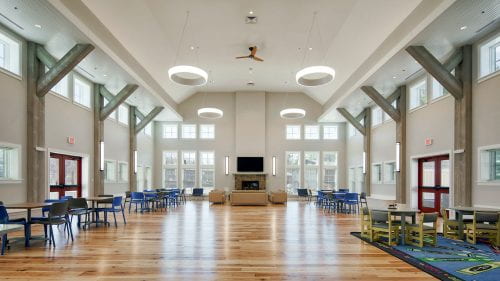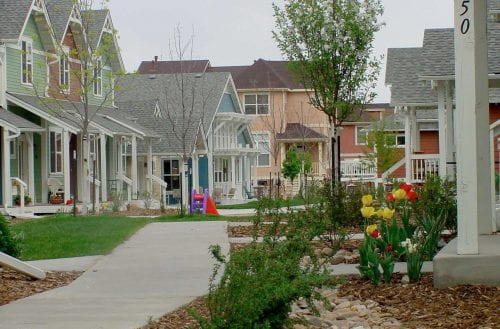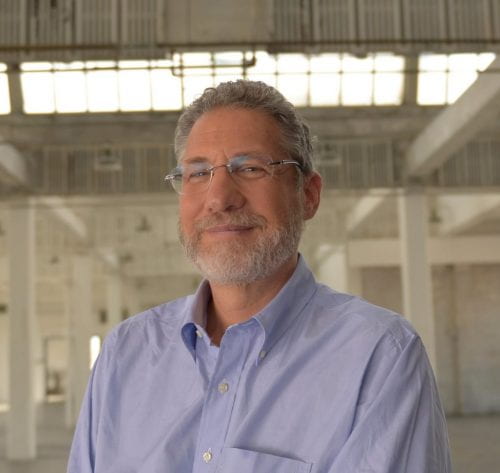Now more than ever, amid the coronavirus crisis, Americans are aware of the tradeoffs between economic growth and social, environmental, and health concerns. This is not a new paradigm; the latest crisis has simply revealed these tradeoffs in a more conspicuous light. Much of our economy relies on extracting limited resources, tangible materials like concrete and steel for buildings as well as people’s finite energy and creativity consumed by unfulfilling work. Real estate developer, author, and urban planner, Jonathan Rose, terms this a “degenerative paradigm”. Contrary to this predominant model of consumption, Mr. Rose has spent the last thirty years building a company that enhances the ecological and social commons. In other words, a regenerative business that gives back more than it takes. Mr. Rose’s eponymous, full-service real estate company puts his philosophy into practice via affordable, environmentally-sustainable developments—enhanced by his core focus on building community and compassion.
Mr. Rose was born to be a real estate developer. He began his career working for his family’s real estate company, Rose Associates. However, it was soon apparent that conventional real estate investment and development was not for him. In 1979-80, Mr. Rose redeveloped the American Thread building in New York City’s TriBeCa neighborhood. Upon completion, it would become the first residential building to provide tenants with computers and internet access—a mere four years after the release of the Apple II computer. Not long after, in 1984, amid a growing affordable housing crisis in New York City, Mr. Rose won the Request for Proposal to develop the Atlantic Center Terminal in Brooklyn. It would become the first large-scale, mixed-use, mixed-income, environmentally conscious master planned development in the United States. The Atlantic Center Terminal project taught Mr. Rose a lifelong lesson. A primary responsibility for leaders in real estate is to identify emerging trends, technological, social, or otherwise, and actively shape these trends rather than passively riding the wave.
While the housing affordability crisis in America has grown in breadth and severity since the 1980s, Mr. Rose has continued to mold the way we tackle this problem, through both new development and the acquisition and preservation of existing affordable housing. For example, the Squire Village in Manchester, Connecticut is an affordable housing development built in the late 1970’s that the firm purchased, and renovated, making it greener. It is complete with solar panels and a two million-dollar community center that has sometimes been compared to a private golf club. Clearly, these features are not typically present in an affordable housing projects, yet herein lies the competitive advantage of the Jonathan Rose Companies. By investing heavily in the communities they are building—including providing English and computer training courses, access to medical care, and partnering with food banks—Mr. Rose is contributing to a “circle of opportunity” consistent with his philosophy of regenerative business.

This unique philosophy is not at odds with the typical goal of profit maximization, in fact, quite the opposite. In an early identification of value in walkability over urban sprawl, Mr. Rose renovated one of the first LEED Gold office buildings –the Joseph Vance and Sterling Buildings in Seattle, Washington. This redevelopment drew in many non-profits and entrepreneurs who wanted to occupy a space that aligned with their own values. When the great recession hit and Class B office building occupancy sunk to 83%, these buildings remained 95% occupied. In fact, the investment fund that owned this property was the only 2005 vintage investment fund of its kind to make a distribution to investors every single year.
It is this power of purpose that has been the driving force behind Jonathan Rose’ success on all fronts. Investment in sustainability leads to greater tenant stability in a time of major market disruption. The resulting investment outperformance leads to the ability to raise additional funds, which can then be reinvested in communities, thus continuing this virtuous cycle. Without his unique strategy, some of Jonathan Rose’s most successful projects may never have happened in the first place.
Enter Highlands’ Garden Village in Denver, CO. A transit oriented mixed-use development that Mr. Rose built on the site of an abandoned amusement park. In a city hearing regarding the development, opposition groups bussed in people to stand against the Highlands’ Garden Village. The very first community member to comment summed it up nicely; “I came here to protest this project, but the truth is I didn’t really know what it was, and now that I see what it is – it is great! How do I get on the list for senior housing?”

Mr. Rose’s relentless intellectual curiosity began early in life, earning a degree in psychology and philosophy from Yale, and a Master’s in Urban Planning from the University of Pennsylvania. This lifelong pursuit of cross-disciplinary learning has allowed Mr. Rose to merge his academic and real estate experience in a way that cohesively marries aspects of technology, environmental sustainability, and innovation. It is this multifaceted approach that leaders and future leaders in real estate should learn from. In the words of the renowned architect Christopher Alexander, “Making wholeness heals the maker”.

